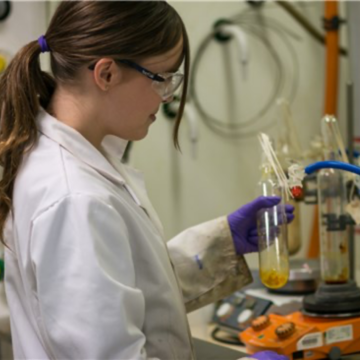SCGC-FIRST Round Two Launched to Accelerate Sustainable Innovations in the Chemicals Industry

SCGC-FIRST Round Two Launched to Accelerate Sustainable Innovations in the Chemicals Industry
The University of Oxford and SCG Chemicals Public Company Limited (SCGC) are excited to announce round two of the SCGC-FIRST (Fund for Innovation and Research in Sustainability and Technology). This initiative aims to propel cutting-edge research and innovations from Oxford’s laboratories into practical, sustainable solutions for the global chemicals industry.
Round two opens on 9th September 2024, with a closing time and date of 4pm, 25th October 2024. The £1 million SCGC-FIRST fund can provide up to £80K to nurture novel ideas and early-stage research. Successful projects should align with SCGC’s environmental, social, and governance (ESG) goals. SCGC will offer the potential for further follow-on funding for projects demonstrating significant impact and scalability.
Key Dates:
- Application Period: 9th September 2024 – 25th October 2024, 4pm
- Prioritisation Committee Review: Mid-December 2024
- Awardees Announcement: Late December 2024
Research Areas for 2024-2025: The SCGC-FIRST will prioritise applications in the following areas:
Energy and carbon reduction
Meeting decarbonisation targets requires reducing CO2 emissions from the difficult-to-abate chemical industry. Key areas include the development and implementation of advanced carbon capture, utilisation, and storage (CCUS) technologies, electrification of processes using renewable energy sources, and the advancement of green chemistry technologies. These green chemistry technologies encompass the use of alternative, non-fossil-based feedstocks, the development of energy-efficient catalytic processes, the implementation of bio-based production methods, and the utilisation of safer, environmentally benign solvents and reagents. Additionally, enhancing energy efficiency through the adoption of state-of-the-art process intensification and more efficient operations are critical. Proposed solutions include but are not limited to
- Carbon neutrality through reduction of GHG emissions, carbon capture, storage and utilisation, and emissions monitoring
- Reducing the cost of carbon capture and storage
- Electrification of processes using renewable energy sources
- Low cost, low carbon footprint hydrogen production
- Electrolyser technologies
- Photovoltaic (PV) cells and related materials; including encapsulation, electron transfer layer
- Sustainable supply chains and logistics
- Novel approaches to utilisation of energy sources
- Sustainable finance and carbon accounting tools for decision-making
Decarbonising thermal process:
Heat generation is a critical component of numerous industrial processes that produce chemicals, metals, minerals, paper, and food. Generating heat has typically relied on fossil fuels because of the high temperatures required, thereby making electrification challenging. Proposed solutions include but are not limited to
- Alternative heating technologies and fuels
- Waste heat management
- Combined heat and power systems
- Low or no heat technologies
Future plastics:
The future of plastics technologies is poised to transform how we produce, use, and recycle plastic materials, addressing critical environmental challenges and advancing sustainability.
- Circular economy of plastics: up-cycling of polymer materials and the creation of markets.
- Novel processes for cost-effective generation of hydrocarbon feedstocks from polymeric materials
- New materials for sustainable outcomes
- Client and consumer behaviour and novel interventions to influence change
Materials for environmental sustainability, and product recovery and circularity:
Solutions in the circularity space encompass material, design, and system dimensions. Approaches to evaluate material and product circularity are particularly of interest, particularly those that incorporate first principles and simulation-based tools. Systems-level initiatives that cut across industries are also relevant. Proposed solutions include but are not limited to
- Novel computational and experimental approaches to accelerated materials discovery
Battery Technologies and Battery Recycling
The transition to electric vehicles (EVs) requires large amounts of raw materials, such as lithium, nickel, cobalt, copper and graphite, to manufacture the batteries that power them. When these batteries reach end-of-life (EOL), it is important that the materials they contain are appropriately managed and their value maintained. Proposed solutions include but are not limited to
- New battery chemistry
- Battery recycling
- Battery separator materials
Applications and implications of machine learning and artificial intelligence to sustainability in the chemical industry:
Machine learning (ML) and artificial intelligence (AI) hold substantial promise for tackling climate and sustainability challenges in the chemical industry. These technologies can streamline processes, boost energy efficiency, and minimise waste, leading to reduced carbon emissions. This area of focus includes:
- Leveraging AI/ML to mitigate the chemical industry's environmental impact
- Devising strategies to lessen the ecological footprint of AI/ML technologies themselves.
Environmental impacts, next generation sustainability assessments for carbon, water, and biodiversity:
There is wide agreement that these are high priority topics for SCGC and society, but the accounting methods are nascent (for carbon and water) or non-existent (for biodiversity). Robust approaches for sustainability assessments are critical to measuring progress towards corporate and societal targets, as well as regulated and voluntary markets. There is a need for
- Carbon accounting methods that consider the complexities of implementing mitigation mechanisms across markets
- Water accounting methods that encompass scarcity and security
- Water and energy reduction, recovery, and reuse
- wastewater and effluent treatment prior to discharge
- Quantitative biodiversity metrics for flora and fauna, and improved allocation approaches for setting corporate science-based targets in line with global climate targets
Innovation:
- Open call for applications on any topic of innovation relevant to SCGC but not covered in the topics listed above.
Further information and application details can be found on the SCG-Oxford Centre of Excellence website.
The SCGC-FIRST initiative exemplifies the collaboration between the University of Oxford and SCGC, aimed at fostering sustainable innovation and addressing global environmental challenges through cutting-edge research. We look forward to seeing the ground-breaking projects that will emerge from the 2024-2025 round and their potential to shape a sustainable future for the chemicals industry.


